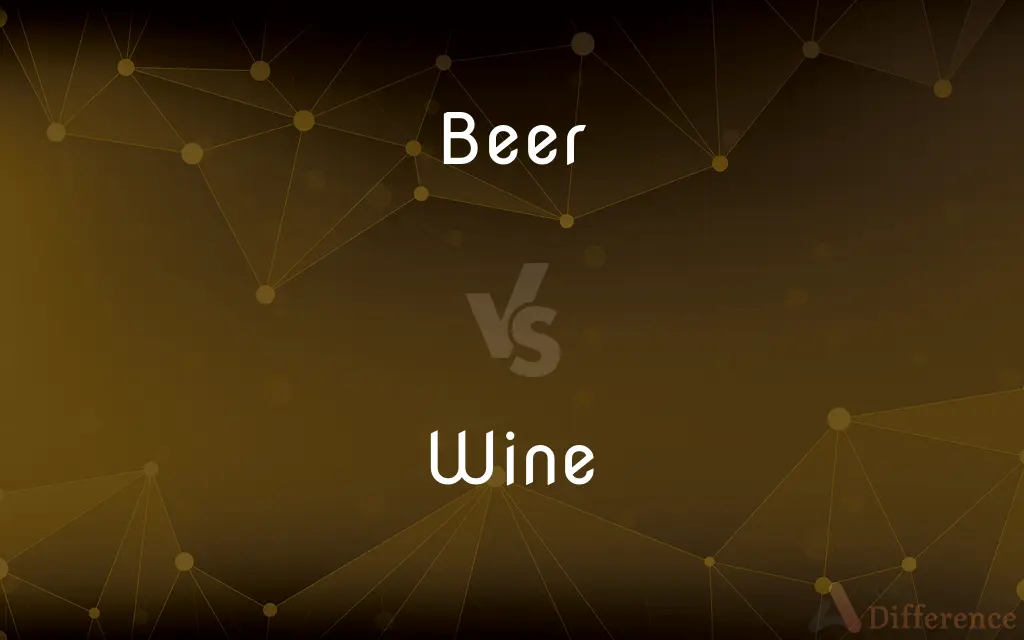Beer vs. Wine — What's the Difference?
Edited by Tayyaba Rehman — By Urooj Arif — Updated on April 21, 2024
Beer is typically brewed from barley and hops, offering a variety of flavors from bitter to sweet; wine is made from fermented grapes, ranging from dry to sweet and is generally higher in alcohol content.

Difference Between Beer and Wine
Table of Contents
ADVERTISEMENT
Key Differences
Beer is primarily made from water, grain (usually barley), hops, and yeast, which contributes to its diverse array of flavors and styles, from light lagers to rich stouts. Wine, on the other hand, is produced by fermenting grapes, which naturally contain all the necessary ingredients for fermentation, resulting in flavors that strongly reflect their variety and the soil and climate of their origin.
Beer production typically involves brewing and fermenting for a few weeks, allowing for a quick turnaround in production. Wine production requires a longer fermentation process, often followed by aging that can last from a few months to several years, which enhances its complexity and flavor depth.
The alcohol content in beer generally ranges from about 4% to 12% by volume, making it usually lighter in alcohol compared to wine. Wine, whereas, typically has an alcohol content from about 12% to 15%, though some fortified wines can exceed 20%.
Beer is often enjoyed in larger quantities and is commonly associated with casual occasions and social gatherings. Wine, on the other hand, is frequently associated with formal dining and is often consumed in moderate amounts to complement food.
The serving temperature for beer varies widely depending on its style; lighter beers are served colder, which can mask some of the complexity, while darker ales are served at warmer temperatures. Wine also varies with serving temperatures, generally chilled for whites and room temperature for reds, aimed at optimizing the flavor and aroma profiles.
ADVERTISEMENT
Comparison Chart
Ingredients
Water, barley, hops, yeast
Grapes
Production Time
Few weeks
Months to years
Alcohol Content
4% to 12%
12% to 20%+
Typical Consumption
Larger quantities, casual
Moderate amounts, formal
Serving Temperature
Varies widely, colder for lighter beers
Whites chilled, reds at room temperature
Compare with Definitions
Beer
A beverage made by brewing and fermentation.
Home brewing beer has become a popular hobby.
Wine
An alcoholic drink that is usually served with dinner and has a rich cultural history.
The wine list at the restaurant was impressively extensive.
Beer
A single serving of beer, typically in a can or bottle.
She grabbed a beer from the fridge after work.
Wine
An alcoholic drink made by fermenting the juice of grapes.
They toured the vineyard and sampled several wines.
Beer
Any of various beverages, whether alcoholic or not, made using a brewing method.
Ginger beer is popular as a non-alcoholic option.
Wine
A beverage made by fermenting fruits other than grapes, but still called wine.
Have you ever tried apple wine?
Beer
The category of alcoholic beverages produced by brewing.
His beer preference changes with the seasons.
Wine
The business or science of producing wine.
He decided to study viticulture to understand wine production better.
Beer
A fermented alcoholic beverage brewed mainly from malted barley, hops, yeast, and water.
He ordered a pint of beer at the local pub.
Wine
A specific type of wine characterized by color, flavor, and preparation method.
She prefers red wine over white.
Beer
Beer is one of the oldest and most widely consumed alcoholic drinks in the world, and the third most popular drink overall after water and tea. Beer is brewed from cereal grains—most commonly from malted barley, though wheat, maize (corn), rice, and oats are also used.
Wine
Wine is an alcoholic drink typically made from fermented grapes. Yeast consumes the sugar in the grapes and converts it to ethanol, carbon dioxide and heat.
Beer
A fermented alcoholic beverage brewed from malt, usually flavored with hops.
Wine
An alcoholic drink made from fermented grape juice
He opened a bottle of red wine
The regional foods and wines of France
Beer
A fermented beverage brewed by traditional methods that is then dealcoholized so that the finished product contains no more than 0.5 percent alcohol.
Wine
Entertain someone by offering them drinks and a meal
Members of Congress have been lavishly wined and dined by lobbyists for years
Beer
A carbonated beverage produced by a method in which the fermentation process is either circumvented or altered, resulting in a finished product having an alcohol content of no more than 0.01 percent.
Wine
Dance with rhythmic gyratory movements of the pelvic region
The crowd jumped and wined and churned the field into mud
Beer
A beverage made from extracts of roots and plants
Birch beer.
Wine
A beverage made of the fermented juice of any of various kinds of grapes, usually containing from 10 to 15 percent alcohol by volume.
Beer
A serving of one of these beverages.
Wine
A beverage made of the fermented juice of any of various other fruits or plants.
Beer
(uncountable) An alcoholic drink fermented from starch material, commonly barley malt; often with hops or some other substance (like gruit) to impart a bitter flavor.
Beer is brewed all over the world.
Wine
Something that intoxicates or exhilarates.
Beer
(uncountable) A fermented extract of the roots and other parts of various plants, as spruce, ginger, sassafras, etc.
Wine
The color of red wine.
Beer
(uncountable) A solution produced by steeping plant materials in water or another fluid.
Wine
To provide or entertain with wine.
Beer
(countable) A glass, bottle, or can of any of the above beverages.
I bought a few beers from the shop for the party.
Can I buy you a beer?
I'd like two beers and a glass of white wine.
Wine
To drink wine.
Beer
(countable) A variety of the above beverages.
Pilsner is one of the most commonly served beers in Europe.
I haven't tried this beer before.
Wine
An alcoholic beverage made by fermenting grape juice, with an ABV ranging from 5.5–16%.
Wine is usually stronger than beer.
"Wine improves with age but I improve with wine," she slurred as she slid gracefully beneath the table.
Beer
(nonstandard) One who is or exists.
Wine
An alcoholic beverage made by fermenting other substances, producing a similar ABV.
...dandelion wine, rice wine, plum wine...
Beer
To give beer to (someone)
Wine
(countable) A serving of wine.
I'd like three beers and two wines, please. My friend will have the same.
Beer
A fermented liquor made from any malted grain, but commonly from barley malt, with hops or some other substance to impart a bitter flavor.
Wine
(uncountable) The color of red wine, a deep reddish purple.
Beer
A fermented extract of the roots and other parts of various plants, as spruce, ginger, sassafras, etc.
Wine
Wind.
Beer
A general name for alcoholic beverages made by fermenting a cereal (or mixture of cereals) flavored with hops
Wine
(transitive) To entertain with wine.
Wine
(intransitive) To drink wine.
Wine
The expressed juice of grapes, esp. when fermented; a beverage or liquor prepared from grapes by squeezing out their juice, and (usually) allowing it to ferment.
Wine is a mocker, strong drink is raging, and whosoever is deceived thereby is not wise.
Bacchus, that first from out the purple grapeCrushed the sweet poison of misused wine.
Wine
A liquor or beverage prepared from the juice of any fruit or plant by a process similar to that for grape wine; as, currant wine; gooseberry wine; palm wine.
Wine
The effect of drinking wine in excess; intoxication.
Noah awoke from his wine.
Wine
Fermented juice (of grapes especially)
Wine
A red as dark as red wine
Wine
Drink wine
Wine
Treat to wine;
Our relatives in Italy wined and dined us for a week
Common Curiosities
What is the basic ingredient of beer?
Beer is primarily made from barley, though other grains can be used.
How does the alcohol content compare between beer and wine?
Wine generally has a higher alcohol content than beer.
Can wine be made from fruits other than grapes?
Yes, although it's still typically referred to as wine, like apple wine or cherry wine.
Can beer be non-alcoholic?
Yes, there are non-alcoholic beers that mimic the taste of alcoholic beers.
In what settings are beer and wine typically consumed?
Beer is often associated with casual gatherings, whereas wine is common in more formal settings.
How long does it take to produce beer compared to wine?
Beer production is quicker, often taking only a few weeks, while wine production can take months to years.
Why are different beers served at different temperatures?
The serving temperature can enhance or mask flavors, depending on the style of beer.
What are some common types of beer?
Common types include ale, lager, stout, and IPA.
What is the basic ingredient of wine?
Wine is primarily made from fermented grapes.
What is a fortified wine?
A fortified wine has extra alcohol added, typically brandy.
What determines the flavor profile of a wine?
The grape variety, along with the soil and climate where it's grown, heavily influences wine's flavor.
Is beer or wine older in terms of historical production?
Beer is generally considered to have a longer history, dating back thousands of years.
What are some common types of wine?
Popular types include red, white, rosé, and sparkling wines.
What determines the flavor profile of a beer?
The type of grains, hops, yeast, and brewing process all influence beer's flavor.
Why are different wines served at different temperatures?
The temperature can significantly affect the taste and aroma of wine.
Share Your Discovery

Previous Comparison
Maze vs. Haze
Next Comparison
Consumer vs. UserAuthor Spotlight
Written by
Urooj ArifUrooj is a skilled content writer at Ask Difference, known for her exceptional ability to simplify complex topics into engaging and informative content. With a passion for research and a flair for clear, concise writing, she consistently delivers articles that resonate with our diverse audience.
Edited by
Tayyaba RehmanTayyaba Rehman is a distinguished writer, currently serving as a primary contributor to askdifference.com. As a researcher in semantics and etymology, Tayyaba's passion for the complexity of languages and their distinctions has found a perfect home on the platform. Tayyaba delves into the intricacies of language, distinguishing between commonly confused words and phrases, thereby providing clarity for readers worldwide.














































